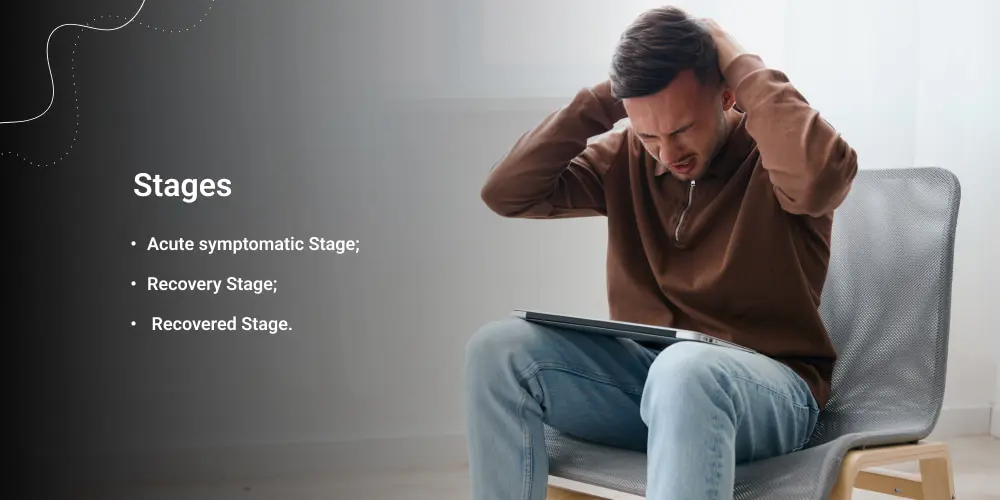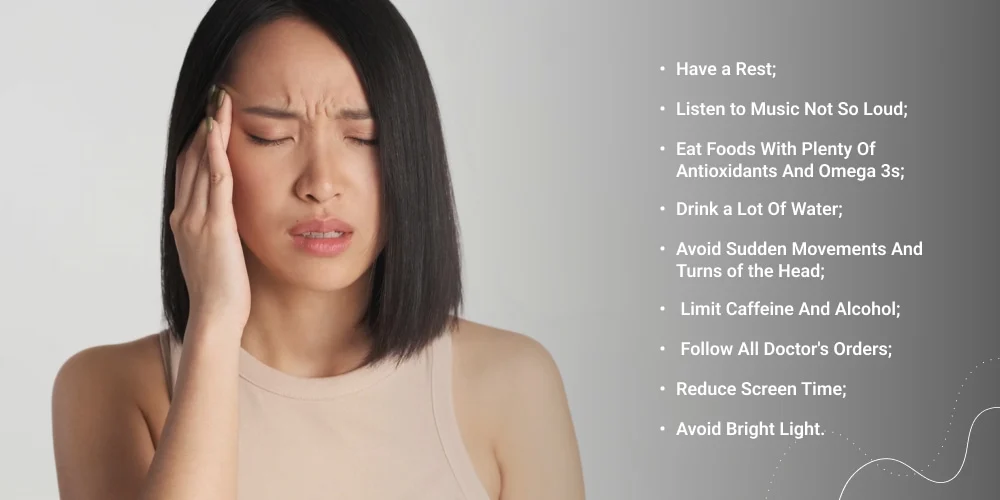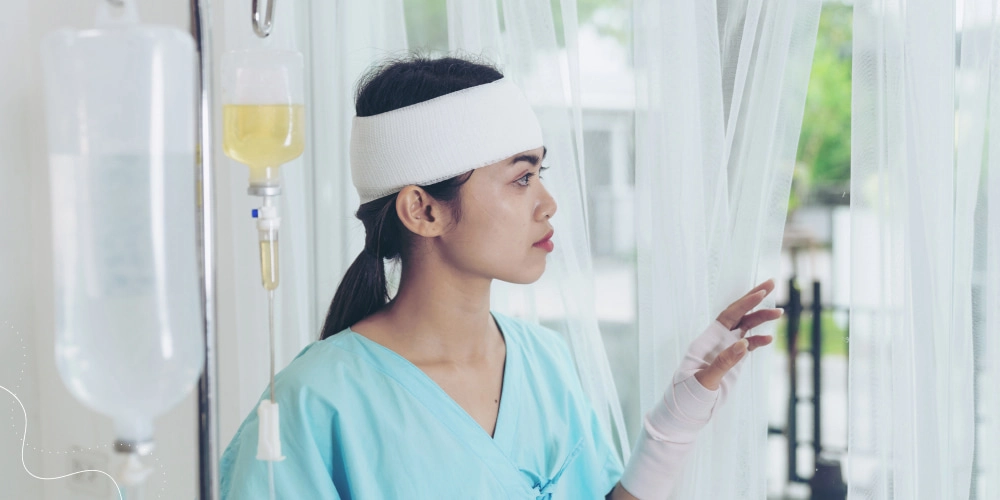Concussions are traumatic brain injuries that cause temporary disruptions in brain function. This might happen as a result of a head injury or when the head and body are severely shaken. They are frequently caused by sports injuries, but they can also be caused by vehicle accidents, falls, or any other occurrence that results in a quick movement or force on the head.
General symptoms are:
- Headache.
- Nausea.
- Dizziness.
- Concentration is difficult.
- The mood shifts.
If you believe you or someone you know has had a concussion, get medical assistance immediately. There is no one-size-fits-all therapy for the disease, although most individuals require some rest and healing time.
With the proper care, most people make a full recovery. Read on to learn more about treatment and recovery. We will answer the main question of how long to recover from a concussion, how to do it correctly, and what rules you must follow.
Stages Of Concussion Recovery
According to the Centers for Disease Control and Prevention (CDC), concussions account for about 2.5 million emergency room visits annually in the United States. While you are getting injured, it is also essential to understand the stages of the disease. This is critical since when determining the correct phase of the disease or its treatment, it is necessary to select the proper medication and methods to facilitate the course of the disease.
Although they are often considered sports-related injuries, they can occur in any condition, from car accidents to home falls. There are three main stages of recovery.
Stage 1: Acute Symptomatic Stage
This stage can last from minutes to days and even weeks.
At this stage, your doctor will likely recommend avoiding activities that could put you at risk for another trauma, such as contact sports. If your symptoms do not improve within a week, your doctor may recommend additional treatment.
Stage 2: Recovery Stage
This stage can last from days to weeks and is characterized by the disappearance of symptoms.
During this stage, your symptoms should gradually improve. If you are still experiencing symptoms after a week, your doctor may recommend physical therapy or other treatments to help you recover.
Most people with this condition recover within a few weeks, but some may experience symptoms for longer. If you or your child has been diagnosed with a concussion, it is vital to get plenty of rest for the best treatment. It would be best if you also avoid activities that could put you at risk for another injury.
Stage 3: Recovered Stage
You have now fully recovered from your concussion and can return to all of your normal activities. If you experience any symptoms during this stage, contact your doctor. All symptoms should disappear during this stage.
At this stage, it is vital to gradually return to the normal rhythm of life; you can add a little sport and active movements. However, you should never forget that your body may not fully recover, so always be careful.
How To Help The Body Recover Faster
For a person to quickly and successfully recover from a concussion, long stages of recovery should be followed. To do this, you must follow many rules and maintain a state of health at a certain level. More about this in the following blocks.
After all, your recovery depends on how correctly you will deal with your body’s recovery and how honestly and accurately you will follow all the rules and instructions of the doctor. We have collected the most popular and working options on how to help your body recover as efficiently and quickly as possible. More on this below.
Have a Rest
Rest is essential for recovery from a concussion. It gives your brain time to recover. Avoid physical activity and mentally demanding tasks until you feel better. Most people need more sleep than usual for the first week after trauma. A good night’s sleep helps your brain heal.
Listen to Music Not So Loud
Too much noise can make symptoms worse. Please, listen to music at a low volume or use headphones. Always take care of your hearing and ears even if you don’t have this condition.
Eat Foods With Plenty Of Antioxidants And Omega 3s
Foods like salmon, blueberries, and spinach contain antioxidants and omega 3s. These nutrients help support brain health. Forget about cheesecakes, hamburgers, and beer. Now your best friends are fiber in vegetables, protein in meat and fish, and slow carbohydrates in cereal.
Drink a Lot Of Water
Drink plenty of water to stay hydrated. Dehydration can make symptoms worse. To avoid it, increase fluids. Drink lots of water and other clear liquids like broth or decaffeinated tea. Avoid caffeinated drinks like coffee, tea, and soda.
Avoid Sudden Movements And Turns of the Head
A concussion can cause your brain to be injured. To prevent this from happening, avoid sudden movements or turns of the head.
Be sure to keep your head and neck still when you sneeze, cough, or blow your nose. These activities can strain your neck muscles and increase the risk of further injury.
Follow All Doctor’s Orders
Talk to Your Doctor. This disease can have long-term effects. Follow up with your doctor to ensure you are on the right track to recovery.
Limit Caffeine And Alcohol
Drinking caffeine and alcohol can delay recovery from a concussion. Try to consume less of these drinks and drink more water.
Reduce Screen Time
Limit time spent on electronics such as:
- Computers.
- Tablets.
- Phones.
- Video games.
Taking long breaks between gaming sessions, watching movies, or other activities with your electronic devices is also very important.
Avoid Bright Light
Stay in a quiet, dim, or dark room. You may want to wear sunglasses.
You can read about Concussion Do’s and Don’ts more detailed in our other article.
How to Treat a Concussion
This severe injury can have long-lasting effects if not treated properly. If you or someone you know has suffered a concussion, it is crucial to seek medical attention and follow the doctor’s instructions.
However, there are practical tips on relieving pain, symptoms, and feeling better after getting a concussion. These techniques are primarily free and relatively easy to implement at home.
So, let’s move on to them, make your condition more manageable, and speed up the treatment.
Important Note! Although these techniques can be practiced at home, you still need to consult with your healthcare provider. Only he can prescribe the proper treatment and exclude all activities that can harm you.
Physical and Mental Relaxation
It is important to physically and mentally relax as part of the recovery process from a concussion. Avoid any activities that could put unnecessary stress on your body or mind. This includes things like:
- Working out.
- Studying for exams.
- Spending time on social media.
TIP. If you are feeling overwhelmed, take a few deep breaths and try to focus on positive thoughts. Once you feel more relaxed, you can resume your normal activities.
Getting plenty of sleep and rest is crucial for recovery from a concussion. Most people need around 8 hours of sleep per night, but you may need more or less depending on how you feel. Taking breaks during the day is also important to rest your brain.
Go About Your Daily Routine
Sticking to your normal routine as much as possible after sustaining a concussion is important. This includes things like:
- Going to school or work.
- Spending time with family and friends.
Doing your usual activities will help you feel more like yourself and speed up recovery.
Socialization Is Vital
If you feel overwhelmed or anxious after sustaining a concussion, talk to someone who can help. This could be a friend, family member, therapist, or doctor. Talking about how you are feeling can help reduce stress and promote healing.
Relief Of Pain Syndrome
Some treatments can help relieve the symptoms of a concussion. These include:
- Over-the-counter pain medication.
- Ice packs.
- Physical therapy.
If you are experiencing severe symptoms, your doctor may prescribe stronger medication.
It is essential to follow up with your doctor after sustaining a concussion. They will be able to monitor your recovery and give you specific instructions on how to care for yourself.
Bottom Line
If you or your family have a concussion, recovery is possible with only the proper steps. Our simple tips will help you recover quickly and tell you what treatment steps are available.
You should consider only reliable services to get the most effective and affordable medical care. You can use the special contact button to make an appointment with a doctor. After that, you will need to wait for feedback and follow the instructions that will be provided to you by the manager.
FAQs
- Can the brain heal after a concussion?
Yes, your brain can be absolutely healed after the disease. But it can take some time to do it. As a result, you can still experience some symptoms after the recovery.
- What happens if you don’t rest after a concussion?
It can lead to altered mental states, such as confusion or unusual change in alertness. Fluid buildup in the brain may cause headaches, nausea, and vision problems.
- How long does it take for a concussion to heal?
Approximately 80 percent of concussions resolve over seven to 14 days, with an average of 10 days. People with concussions should never return to sports or other physical activity sooner than one week from sustaining the injury.
- Why am I so tired after a mild concussion?
After a concussion, your brain has less energy to spare than it usually does. Everything now takes up a little more energy than before. This can make you feel tired and lose energy. This is called fatigue.













Please, leave your review
Write a comment: